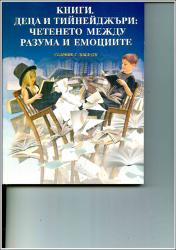| dc.identifier.citation | ALTINTAŞ, Uğur and ALTAY, Ahmet (2017). “Endearing literature to children with humor: The logic of humor in children's literature” Rositsa Petrova Vasileva (compiler) Books, Children and Teenagers - Reading between Reason and Emotions: Collection of Reports of the Round Table Sliven, 9-11 May 2017, Sava Dobroplodni Regional Library, Sliven, pp. 83-88 (Bulgarca); 89-94 (İngilizce). (ISBN 978-6197239-11-9) | |
| dc.description.abstract | As a literary or rhetoric terminology, humor comes into existence in many forms. Humor can be divided into myriads of categories as a literary term, i.e. satire, pun, riddle, etc. Regardless of what form humor gets into, it catches the attention of reader, and makes the text more colorful for reading. Humor also makes any text more pleasurable, and it is, in a way, a tool to make the text more reader centered, in that humor is an endeavor to lean greatly on the mind of reader so that author can convey a better understanding of the topic. Reader’s intelligence and socio-cultural background, along with many other traits, involve in the process of humor elicitation. To put it simply and paradoxically, humor can be defined as a literary tool that makes the text slightly more difficult to understand so as to achieve a better convey of the message and make it more comprehensive and comprehensible. Due to its high level of dependency upon the cultural past and personal traits like IQ, it is so hard to achieve a universal humor. A story can be found funny by a person; however, this does not mean that another would find it funny at the same level. There are so many examples on the cultural differences on humor elicitation; in that, a Turkish person does not even smile at a German joke, and vice versa. So, it would be safe to claim that a successful humor carries a cultural history behind it. In other words, humor is created through the involvement of many cultural elements. However, a simple reason of macro level cultural elements falls short for explaining humor elicitation thoroughly. The question here is ‘why do people tend to laugh more when they involve in the humorous activity –i.e. comedy films and theaters, storytelling, standup shows, etc.- as a group?’ This is simply due to the social side of humor elicitation. All things considered, humor is a social phenomenon that includes both micro and macro scale cultural interaction which requires a shared and deep understanding of the situation, and in many cases, humor is the best reaction to that situation. Since humor takes its roots from the pure culture and shared mindset, it can also be devised for the creation of a new culture. This study aims to define humor in a sense that can be used as a harmless and joyful tool to endear reading and to create the behavior of reading in children and youngsters. Upon a brief presentation of humor theories in general, this essay will seek to figure out certain traits of humor that can direct children to reading. Some of much humor containing literature for children will be analyzed, and lastly, some offers will be made concerning what to do and more importantly what not to do while constructing humorous texts aiming at children. | |





















